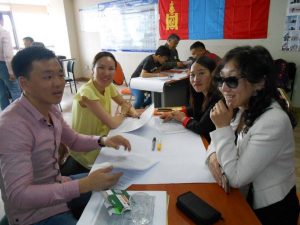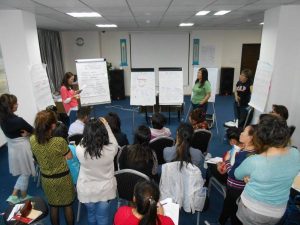-
What We Do
- WHERE WE WORK
-
About Us
 Welcome Message from Carol Jenkins
Welcome Message from Carol JenkinsFor more than 90 years, World Learning has equipped individuals and institutions to address the world’s most pressing problems. We believe that, working together with our partners, we can change this world for the better.
On my travels, I’ve had the opportunity to meet with many of those who have joined us in this mission. In Baghdad, we’ve trained more than 2,300 Iraqi youth who are already giving back at home. In London, our partners in the TAAP Initiative strongly believe that we are all responsible to practice inclusion. And in Vermont, our Experiment in International Living and School for International Training participants prove every day that they have the tools and the determination to change the world.
Please join us in our pursuit of a more peaceful and just world.
- Get Involved
Media Center > Story
Learn How This Mongolian Activist Is Making the World a More Inclusive Place
May 14, 2018
Ariunzul Liijuu-Ochir believes all children have a right to a quality education. As a civil society activist and Leaders Advancing Democracy (LEAD) Mongoliafellow, she’s doing her part to make sure they can access that education.
In 2016, Liijuu-Ochir traveled to a rural village about 300 kilometers from the provincial center of Bayan-Ulgii, the westernmost province of Mongolia and the country’s only Muslim and Kazakh-minority province. Her intent was to collect data and develop recommendations to improve quality of education for public officials. This is a remote area where no one goes, but Liijuu-Ochir and her colleagues were intent on including all voices.
What she found was poor teaching quality and considerable language barriers with little-to-no materials available in Kazakh. “The children are at a disadvantage because they’re not taught in their own language,” she explains. Bayan-Ulgii is consistently listed last among Mongolia’s 21 provinces in quality of education.
Liijuu-Ochir clearly remembers how one young girl from the village raised her hand during the visit and thanked her. “She said no one has come to talk to them before to ask their opinions. So she was thanking me even though I didn’t do anything. People just want to be recognized.”

Next month, Liijuu-Ochir’s work will be recognized in a new documentary called Meet the Changemakers, which tells the stories of seven LEAD Mongolia fellows who share a passion for making the world a more inclusive place. The USAID-funded and World Learning-implemented program offers training, leadership development, and international exchange opportunities for up-and-coming democracy advocates in Mongolia. Social inclusion is one of the values at the core of the program.
Liijuu-Ochir, who has been fighting for children’s rights to quality education for 10 years, has long believed in inclusion. In 2014, Liijuu-Ochir founded the Parent-Teachers Association of Mongolia to get parents involved and advocating for quality of education, which is a new concept in Mongolia. She started off big, trying to get as many parents involved as possible. But she quickly narrowed in on a real need, focusing on parents of children with disabilities and the Kazakh community, whose voices were clearly underrepresented in conversations about education.
Liijuu-Ochir’s work to improve inclusive education has been met with a lot of pushback. Often, she explains, schools don’t want to cooperate, and government officials are resistant to change. On top of that, prevailing stigma against Kazakh minority children, children with disabilities, and others keeps them on the sidelines, unable to access the same education as their peers.
This makes the fight for inclusive education a particularly tough one. “It’s really difficult to change people’s minds,” she adds, referring to her work to address the educational needs of Kazakh children. What she wants to see is equal investment in these schools and a recognition of dual language education. But most people are against it.
As Liijuu-Ochir explains it, many people believe that Kazakhs aren’t really Mongolian and question why they’re in the country at all. At the same time, the Kazakh community has remained reticent to engage in community life. Negative attitudes prevail on both sides.
This is not easy to overcome. But, Liijuu-Ochir believes excluding children will only harm Mongolian society in the future. “We will pay the price one way or another,” she says. “We need to raise children who will be equal contributors in society. If we don’t include them as children, then we have no hope.”
Though Liijuu-Ochir has long been a champion of inclusion, she discovered even more about it through her LEAD Mongolia experience. Alongside a group of 10 other budding anti-corruption advocates, Liijuu-Ochir worked on a transparency project that employed the principles of social inclusion. Their Transparent and Accountable School project set out to rebuild trust between the schools and community of Ulaanbaatar’s Nalaikh District, an underserved area on the outskirts of the city with a sizable Kazakh population.
Transparency hinges on the concept of inclusion: by bringing all voices into discussions about systems of governance, society can root out corruption and hold leaders accountable.
Liijuu-Ochir and the team wanted to provide a platform for teachers, parents, and students to get involved and to realize they have the power to do something about corruption. The intent was to build transparency and trust through public participation in school planning, budgeting, and other processes. During the project planning process, though, the team started to realize they were excluding some stakeholders. “The materials we developed didn’t incorporate children with disabilities,” she says. “Blind children, for example. But we learned as we went, always figuring out where we should be more inclusive.”

She and the team made sure everyone at all levels of the school — principal to janitor — was encouraged to take part. This is an unusual approach in Mongolia. “The project adopted inclusion in a very unexpected way,” Liijuu-Ochir says. “It seems this really made an impact on people.”
It had an effect on Liijuu-Ochir as well. “Before LEAD, I thought I knew everything about inclusion, but in fact I did not,” she says. “LEAD definitely broadened my understanding of inclusion.”
Whatever the challenges, Liijuu-Ochir will continue her campaign for inclusive education. Her experience working with other LEAD Fellows from different backgrounds has fueled her passion. “After LEAD, my network of friends has grown,” she says. “Now I see great potential in collaborating with them and moving forward as one.”
In this trailer for Meet the Changemakers, Liijuu-Ochir explains the importance of promoting social inclusion:
Meet the Changemakers reflects on LEAD Mongolia’s experience piloting the World Learning-led Transforming Agency, Access, and Power (TAAP) Initiative, a systematic approach to integrating inclusion throughout a project’s lifecycle by “tapping” into the voices, skills, and experiences of all people, including those marginalized and excluded from power. LEAD Mongolia is the first project to employ the TAAP approach, which seeks to ensure that participants have the skills to become practitioners of inclusive development. In the film, seven LEAD fellows share their program experiences, as well as their thoughts about social inclusion. It is the story of how TAAP came to life in Mongolia — and holds the promise to support inclusion champions the world over.
Written by Adam LeClair, Project Director, Leaders Advancing Democracy (LEAD) Mongolia





